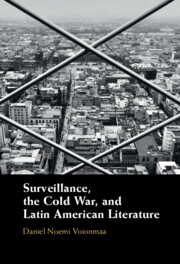Book contents
- Surveillance, the Cold War, and Latin American Literature
- Surveillance, the Cold War, and Latin American Literature
- Copyright page
- Dedication
- Contents
- Figures
- Preface
- Acknowledgments
- Chapter 1 Seeing It All
- Chapter 2 Latin American Archives and Human Matter
- Chapter 3 Cultural Cold War
- Chapter 4 Spying and Knowledge
- Chapter 5 Reading Like a Spy
- Chapter 6 Writing Like a Spy
- Chapter 7 Spying Like a Writer
- Conclusion
- Notes
- Bibliography
- Index
Chapter 1 - Seeing It All
Perspectiva, Panopticon, Panorama, and the Archive
Published online by Cambridge University Press: 18 August 2022
- Surveillance, the Cold War, and Latin American Literature
- Surveillance, the Cold War, and Latin American Literature
- Copyright page
- Dedication
- Contents
- Figures
- Preface
- Acknowledgments
- Chapter 1 Seeing It All
- Chapter 2 Latin American Archives and Human Matter
- Chapter 3 Cultural Cold War
- Chapter 4 Spying and Knowledge
- Chapter 5 Reading Like a Spy
- Chapter 6 Writing Like a Spy
- Chapter 7 Spying Like a Writer
- Conclusion
- Notes
- Bibliography
- Index
Summary
This chapter defines the gaze of modernity, a way of seeing and understanding the world that began during the Renaissance and continued during the Cold War in Latin America. It presents three key moments in the development of this gaze: Brunelleschi's invention of perspectiva artificialis in the 1400s, and its multifaceted consequences in the arts and sciences. Bentham's notion of panopticon in 1787, and its connection to the concept of surveillance. Robert Barker's creation also in 1787, the panorama. Finally, the chapter examines the relevance of the archive in theoretical terms, highlighting the connections to the panopticon and panorama, and discussing some of the archive's fundamental contradictions.
- Type
- Chapter
- Information
- Publisher: Cambridge University PressPrint publication year: 2022

